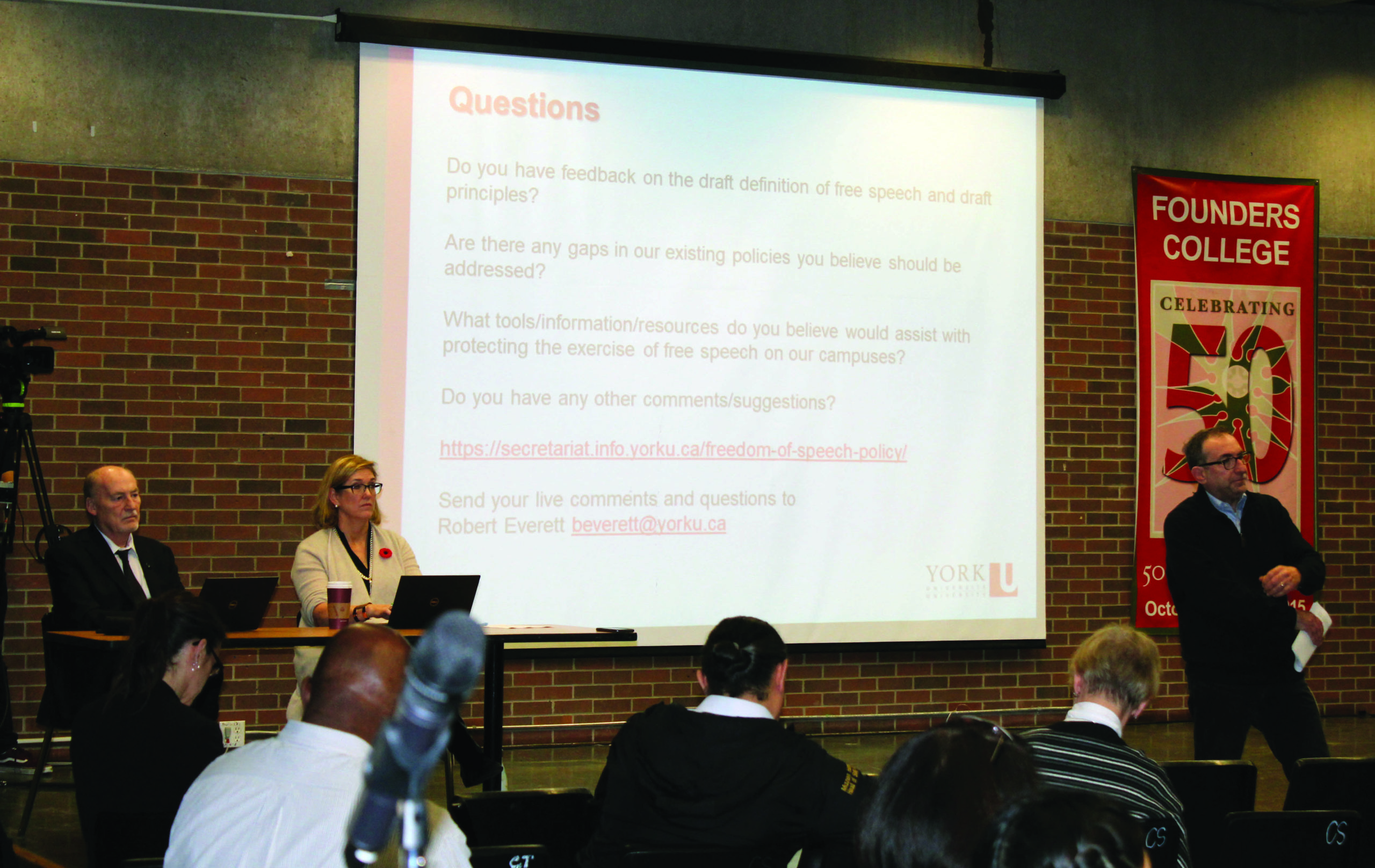Mahdis Habibinia | Executive Editor, Online
Featured Image: York students contest representation regarding new free speech policy. | Justine Monsanto
York’s Working Group has drafted a Free Speech Policies Mandate, Policy Principles & Resources, a response to Premier Doug Ford’s free speech policies directive. Post-secondary schools will be required to develop stronger free-speech policies, and a final mandate by the start of the new year.
On November 6, York held one of three public consultations for the Freedom of Speech Policy draft at the Founders College Assembly Hall. The Consultation was led by Osgoode Hall’s former Dean, Lorne Sossin, now chair of the Freedom of Speech Working Group. Along with Sossin, were York’s Secretary and General Counsel Maureen Armstrong, and Assistant Secretary Robert Everett.
“The goal of this consultation is to share with you our thinking as a Working Group, regarding how this existing array of policies addresses the key issues put to us by government. Therefore, we haven’t embarked on a process to develop a policy; we’ve gathered our existing policies to consolidate, synthesize, and convey them as clearly as possible in one place,” says Sossin.
Open to all York students, faculty, and community members, the consultation invited people to: provide feedback on the draft; recognize any gaps in existing policies that need to be addressed; and suggest tools, information, alternatives, or resources to assist in the protection of free speech on campus on behalf of York.
Noam Yekutiel Sibony, president of Students for Free Speech at York, began by questioning how the Working Group will address dissenting opinions between the YFS and administrative bodies, mentioning the YFS’ motion of “Fighting the Far Right.”
Sossin explains they look to the autonomy of student organizations within frameworks the university has set up to govern, and are finding mechanisms to do justice for all parties involved. “It’s going to take a lot of reflection, community work, and respecting each other’s views,” he says.
Sébastien Lalonde, YFS vice president campaigns and advocacy, claims a need for assurance of student safety. “The freedom of assembly directly contradicts the freedom of expression,” he says. How this will affect student unions and clubs, and how it will navigate protecting students is unclear, as it is absent in the Policy draft. Sossin agreed that this needs to be elaborated on more clearly.
A number of students at the conference claimed there was lack of student union representation for the overwhelming 53,000 students on campus, that are to be affected by this Policy.
YUGSA President Alia Karim expresses that York President Rhonda Lenton has appointed only one student on this Working Group and none from student unions. “This is undemocratic,” says Karim.
Stuart Schussler, one of eight students undergoing punitive action for protesting the recent strike, adds to Karim’s concerns that “there is a lack of involvement with certain groups. In the writing process of the Policy, there aren’t people representing all the range of voices around York.”
Sossin acknowledges this issue with empathy but also believes “the Working Group will genuinely reflect those critical voices.”
Schussler adds: “Freedom of expression is treated in a negative manner—that it has limits. There’s little attention to how it will be embraced.
Consultations for the Policy will conclude at the beginning of next week, and the first draft will be seen by the Senate Executive on November 20.
Others issues brought up by various York students and community members included: further emphasis on student union representation for this Policy; the small threshold of meeting the January 1st deadline gave way to a provisional policy being suggested; ensuring student safety when expressing themselves on campus; defining terms such as ‘expression’, ‘racism’, ‘hatred’, ‘harassment’, etc.; ensuring these consultations are taken seriously, recorded, and addressed; and ensuring students are protected.

